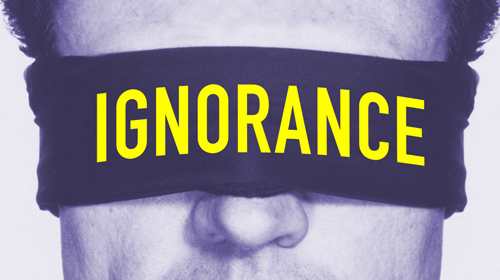I’m sure everyone has heard the sayings “what you don’t know won’t hurt you” or “ignorance is bliss.” Granted, all sayings are not applicable to all situations, but I don’t think people understand how much hatred and misunderstanding is caused by “blissful” or “harmless” ignorance. For instance, the majority of cultural appropriation cases or stereotypes stem from a lack of knowledge. The number of times I’ve seen comments on Instagram of a specific dance from another culture, or an exaggeration of a hairstyle or things like blackface is ridiculous considering we should know better. We all preach about embracing diversity, so why do we question and mock it when it shows? It makes sense to question things that are different, but to make fun of it or try to recreate it without knowing its significance is just absurd and wrong.

We don’t usually get this knowledge in school, nor can we expect to, since academic administrators have so much to educate students about to prepare them for college and various professional pursuits, so honestly, it’s up to us. We can access history at a few touches of our finger, but not knowing everyone’s history in and out isn’t the main issue. Being ignorant about various countries’ customs or norms is detrimental. We can educate ourselves while barely doing anything. Learning about other cultures is extremely important and it’s become so easy to do. Knowing about a place before you visit will improve your visit too. People writing ignorant things on the internet that mock another culture is something that should not be happening with frequency.
A common example of such cultural ignorance is simply making an assumption about another person because of their culture. For instance, though I’m a teenager, somehow any time the prospect of marriage pops up because I am Indian, I get asked “wait, don’t you like, have arranged marriages?” or “whoa, you’re gonna get married really young and then be a housewife.” I’m not denying that arranged marriages or young marriage is not uncommon in India, but there is progression and diversity. Regions of India, mostly rural, do engage in arranged marriages, and women are often married at a younger age and end up staying home. However, a population of 1 billion can’t and shouldn’t be reduced to inadequate, measly stereotypes. Obviously, no harm is meant by such questions since people didn’t know, but that’s the issue. It’s not fair for minority cultures to be seen as inferior or different in a negative way when people have opportunities to learn. It’s not fair for people to not educate themselves about other cultures and then question them for their differences and norms, especially when they expect everyone to respect and know about their culture. Indian culture is one of the most diverse out there; it shouldn’t be stereotypical at all because being Indian is being different, and that is something I am and will always be proud of.
Another common example of cultural ignorance is cultural appropriation. How many times have there been headlines about the Kardashians sporting cornrows? Or an altered skin tone of a model on the cover of a magazine? Or more recently, controversies about dressing up as Moana or characters from the Hawaiian island for Halloween? This pressing controversy is caused because of ignorance.
So, it’s important to try to learn about other cultures. In specific classes like European History or Holocaust & Genocide or even a language class, we get background information on other countries and cultures. Things that might have been weird and confusing because they were different become more sensical. Instead of blindly commenting “ew what” or “why though” or “that’s so weird,” we can take it upon ourselves to answer our own questions, and maybe not be so quick to judge. After all, we are a country that represents the amalgamation of multiple cultures!





























